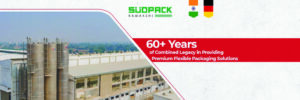NE BUSINESS BUREAU
AHMEDABAD, OCT 13

With a view to strengthen its presence in the flexible packaging sector and diversify its product portfolio, Kamakshi Südpack on Thursday announced that it has recently inaugurated its new flexible packaging manufacturing plant at Bavla near Ahmedabad. Germany-based Südpack, a leading manufacturer of high-performance films for food, non-food, and medical packaging, has invested Rs 100 crore in Kamakshi Südpack (earlier known as Kamakshi Flexiprints Pvt. Ltd.)
Having identified their strengths and synergies, the two companies have jointly made a capital expenditure of Rs 200 crore to come up with the plant. The idea of setting up the plant came up after the two companies entered into an agreement in July 2019 and the plant was commissioned in June 2022.
- The new plant will manufacture a vast range of flexible packaging products providing barrier properties, aesthetics and convenience to the users.
- Our exports have now grown to a significant 40% of the total production and we plan to further expand this: Harish Goel, Chairman and Managing Director, Kamakshi Südpack
The upcoming plant – panning over 2.25 lakh square feet – has an installed capacity of 24,000 metric tonne per annum (MTPA) and will cater to the maturing packaging needs in the Indian market, by manufacturing a diversified range of flexible packaging products providing barrier properties, aesthetics and convenience to the users. The new plant is expected to be fully operationalised by January, 2023.
Speaking on the launch, Harish Goel, Chairman and Managing Director, Kamakshi Südpack, said, “The plant will boast well-designed infrastructure which will include modern extrusion, printing, coating, lamination and bag making capacities. The entire factory is a Green Building as per the India Green Building Council (IGBC) guidelines and shall comply with good manufacturing practices (GMPs) and international regulations and standards of the food industry. We understand the Indian markets; they bring in the latest technology complementing each other. We will also foray into the newer product segments as specialty product offerings. We have employed over 400 technicians in this fully automated plant and most of them are male and locals residing in and around the plant.”
The investment into this plant is a further step towards the international growth strategy of Südpack Group.
Speaking on the occasion, Tharcisse Carl, Managing Director, Südpack Group, said, “We see a growing demand for high-quality barrier, medical and lidding flexible materials in the Indian market mainly due to the evolving matured packaging needs in the Indian sub-continent arising from constant demographic changes. Südpack is highly committed to sustainable development and assumes its responsibility towards society and the environment as well as its customers by offering the most efficient and sustainable packaging solutions. This is our 50:50 joint venture and the first in India.”
“We have found a reliable partner in Kamakshi with shared synergies, a 360 degree approach, strategy and high standards of quality and service to our customers,” Carl further went on to say.
Carolin Grimbacher, Managing Partner, and Head of Research and Development at Südpack Group, said, “We pay more attention to safeguarding environment norms without compromising product safety and guided by the company’s three-pronged strategy of reduce – recycle – replace.”
Kamakshi already has a packaging manufacturing plant in Changodar along the outskirts of Ahmedabad, spanning over 45,000 square foot and an installed capacity to make 3,600 MTPA flexible packaging material. The ancillary machines for bag-making can manufacture 20 crore pouches and 10 crore poly bags per month.
Dairy major Amul and many homegrown companies are some of the reputed clients of the company.
At present, Kamakshi caters to segments, including FMCG, snack foods, seeds, agrochemicals, edible oil, dairy products, personal and homecare products, confectionery, spices and condiments, food grains, salt, agro products, pharmaceuticals, retail apparel, and courier sector, among others. This is primarily in the Indian market, in addition to exporting to Africa.
“FMCG is a major consumer of flexible packaging material. They are always looking for an optimum packaging solution which reduces their packaging cost as a percentage of total cost of packaged goods. This requires continuous improvisation in the existing solutions, and this is where our JV plant has a major role to play. This will not just enable us to cater well to the domestic market but also make greater inroads in the international market. Our exports have now grown to a significant 40% of the total production and we plan to further expand this,” Goel further added.









